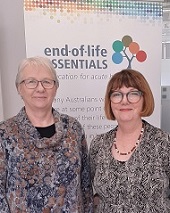Death is a part of life - the core of End-of-Life Essentials
A blog post written by Associate Professor Kim Devery, Project Lead and Ms Deb Rawlings, Co-Lead, End-of-Life Essentials
The End-of-Life Essentials (EOLE) project has received ongoing recognition and support from the Australian Government Department of Health, securing funding for the project until 30 June 2023. The National Palliative Care Strategy, 2018, clearly articulates six aspirational guiding principles that ultimately steer our project:
- Death is a part of life. This fact sits at the core of all our project, education and resources.
- Person-centred care is the centre of respectful and responsive care at the end of life. Compassionate care matters and is a guiding principle of our work at EOLE.
- Everyone has a part to play in provision of palliative and end-of-life care. All doctors, nurses and allied health professionals working in acute hospitals are the audience of EOLE.
- Care is high-quality and evidence based. EOLE provides trustworthy, peer-reviewed and evidence-based education and resources.
- Care is accessible to all Australians. We plan to develop resources for under-served populations (culturally and linguistically diverse; lesbian, gay, bisexual, transgender and intersex; people living with mental illness)
- Carers are valued and receive the support and information they need. We strive to educate health care professionals to know that carers should also receive care and be included in care planning.
Based at Flinders University in The Research Centre for Palliative Care, Death and Dying (RePaDD), EOLE provides free online education and training for nurses, doctors and allied health professionals to improve the quality of end-of-life care in hospitals around Australia.
This was the third successful funding round for the project, with the EOLE education growing in popularity year on year with increasing registrations and completions of the learning modules.
We have supported over 16,000 learners through our online training modules, which not only aim to increase professionals’ knowledge, skill and confidence in end-of-life care in Australian acute hospitals but have also been statistically shown to do so.
We will be developing further education for health care professionals, including around the crucial areas of providing care to under-served populations, specifically people who are culturally and linguistically diverse, LGBTI communities and those people living with mental illness.
The new online modules will be developed and made available in addition to the project’s existing evidence-based and peer-reviewed modules, which include areas such as recognising end of life, goals of care, and dying.
Our national qualitative study has shown the impact of End-of-Life Essentials’ modules on health professionals’ practice, including the ability to have end-of-life conversations. These skills include the ability to initiate conversations about end of life and skills to explore patient and family’s end-of-life expectations and acknowledge grief.
Register for the e-News to stay informed about the new module updates and resources to share with colleagues. More information about the project can be found at https://www.endoflifeessentials.com.au/

Associate Professor Kim Devery, Project Lead of End-of-Life Essentials (pictured right)
Ms Deb Rawlings, Co-Lead of End-of-Life Essentials (pictured left)